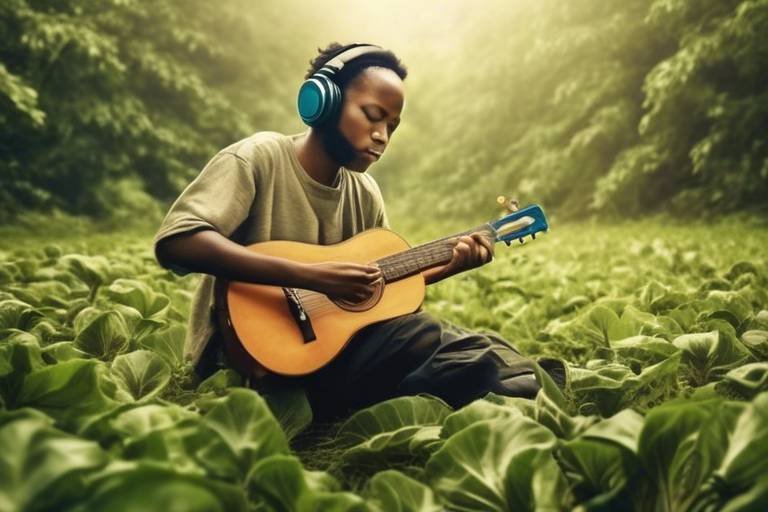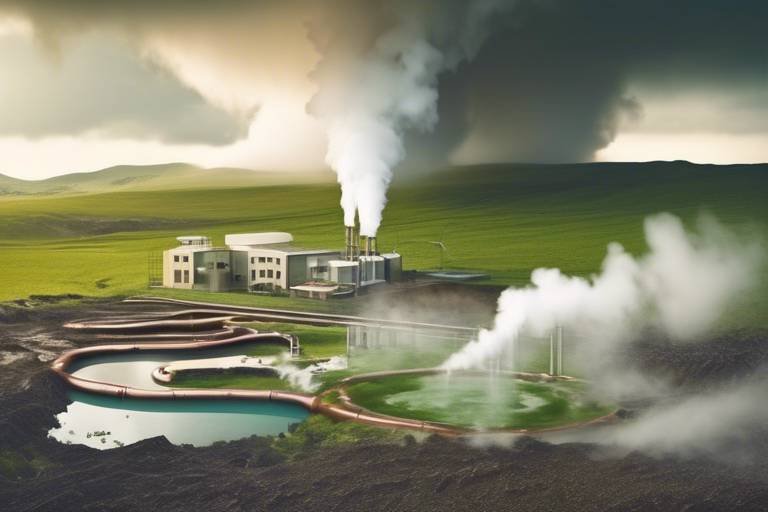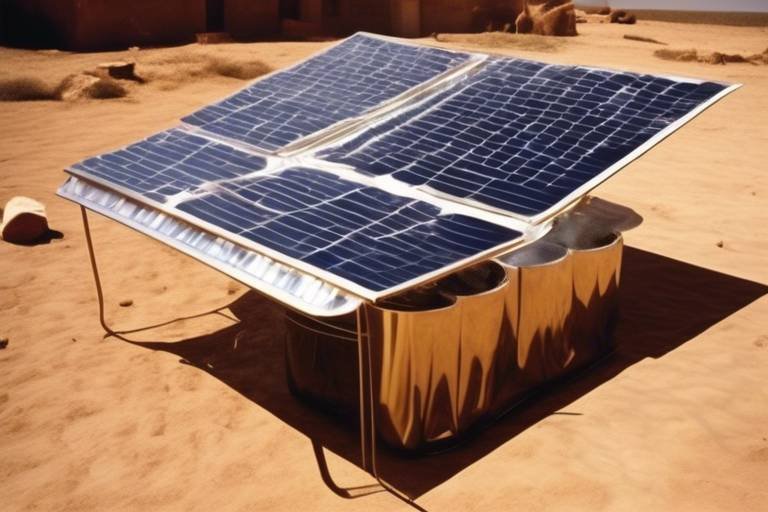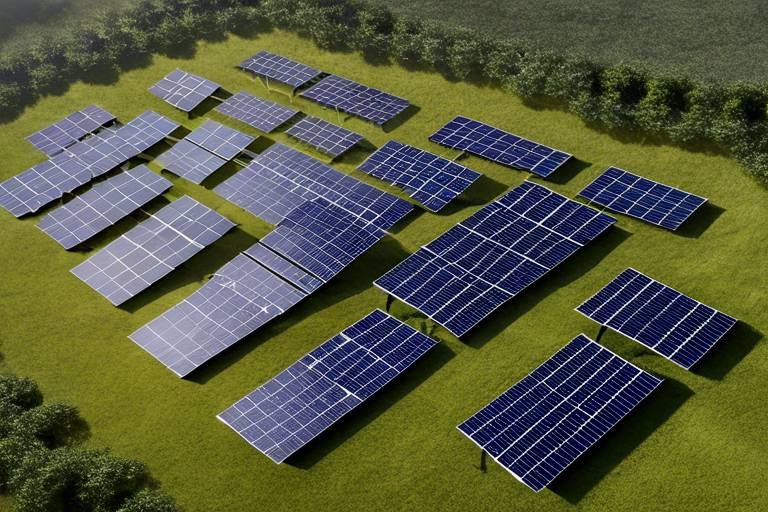The Role of Music in Sustainable Living
In today's world, where environmental challenges are becoming increasingly pressing, the role of music in promoting sustainable living cannot be overstated. Music is not just an art form; it's a powerful vehicle for change. It transcends cultural boundaries, speaks to the heart, and ignites passion in ways that words alone often cannot. From grassroots movements to global campaigns, music has been at the forefront of raising awareness and inspiring action towards a more sustainable future. Imagine a world where melodies not only entertain but also educate and mobilize communities to embrace eco-friendly practices. This article delves into the multifaceted relationship between music and sustainability, highlighting how various musical expressions can foster a deeper connection with our environment.
Music has an incredible ability to convey messages that resonate deeply with listeners. It serves as an effective tool for raising awareness about environmental issues and sustainability efforts globally. Think about your favorite song—how it can evoke emotions, memories, and even inspire you to take action. Artists often use their platforms to highlight pressing environmental concerns, transforming complex issues into relatable narratives. For instance, songs that address climate change or pollution can spark conversations that lead to greater awareness and understanding. Through catchy hooks and memorable lyrics, music can educate listeners about sustainability in ways that traditional media often fails to achieve.
Community events frequently incorporate music to bring people together, fostering collaboration and encouraging collective action towards sustainable living practices. When you attend a local concert or festival, you’re not just there for the entertainment; you’re part of a larger movement. Music has the unique ability to unite diverse groups under a common cause, making it a vital component of community engagement. Events like local music festivals often highlight eco-friendly practices, promoting sustainability through waste reduction initiatives, local sourcing, and raising funds for environmental causes. These gatherings create a sense of belonging and shared purpose, encouraging individuals to work together for a greener future.
Local music festivals are a prime example of how music can promote sustainability. These events often feature artists who are passionate about environmental issues and incorporate eco-conscious practices into their operations. For example, many festivals now implement waste reduction strategies, such as recycling and composting, and source food and products from local vendors to minimize their carbon footprint. By attending these festivals, you not only enjoy great music but also contribute to a movement that supports local economies and environmental stewardship.
Many artists use their platform to advocate for environmental issues, often incorporating messages about sustainability into their lyrics, performances, and public appearances. These eco-conscious musicians understand that their influence can inspire change, and they often engage in activism, whether through benefit concerts or partnerships with environmental organizations. Their songs resonate with fans, encouraging them to adopt more sustainable habits in their daily lives.
Collaborative musical projects can unite diverse groups, encouraging them to work together towards common sustainability goals while celebrating local culture and talent. For instance, community choirs or orchestras may come together for a series of concerts focused on environmental themes, promoting awareness and action in a fun and engaging way. These collaborations not only enhance the musical landscape but also strengthen community ties and foster a shared commitment to sustainability.
Educational programs that combine music with environmental education can inspire younger generations to adopt sustainable practices through engaging and creative learning experiences. Imagine children learning about recycling through a catchy song or understanding the importance of biodiversity through interactive musical activities. Music education can serve as a powerful tool in shaping attitudes towards the environment, encouraging kids to think critically about their impact and the world around them.
The relationship between music and nature is profound, with soundscapes playing a crucial role in connecting individuals to their environment and fostering a sense of responsibility towards its preservation. Nature itself is a symphony of sounds, from the rustling of leaves to the chirping of birds, and these natural soundscapes can inspire musicians to create pieces that reflect the beauty and fragility of our ecosystems.
Field recordings capture natural sounds, raising awareness about biodiversity and the importance of preserving natural habitats through immersive listening experiences. These recordings can be used in various musical compositions, reminding listeners of the beauty of the natural world and the urgent need to protect it. By integrating these sounds into their work, artists can create a powerful emotional connection between their audience and the environment.
Composers often draw inspiration from nature, creating pieces that reflect environmental themes, encouraging listeners to appreciate and protect the natural world. Whether it’s a symphony inspired by the ocean or a folk song about the changing seasons, these musical representations serve as a reminder of our connection to the earth. They invite listeners to reflect on their own relationship with nature and the impact of their actions.
As the music industry evolves, there is a growing emphasis on sustainable practices, from eco-friendly production methods to promoting messages of environmental responsibility through various musical genres. Artists and producers are increasingly aware of their environmental footprint and are taking steps to minimize it. This shift not only benefits the planet but also resonates with a growing audience that values sustainability. The future of music is not just about entertainment; it's about creating a harmonious relationship with our environment.
- How can music raise awareness about environmental issues? Music can convey powerful messages and emotions that resonate with listeners, making complex issues more relatable and inspiring action.
- What role do local music festivals play in promoting sustainability? Local music festivals often incorporate eco-friendly practices and raise funds for environmental causes, bringing communities together to support sustainability.
- How can music education influence sustainable practices? Music education can engage younger generations in environmental issues, encouraging them to adopt sustainable habits through creative learning experiences.
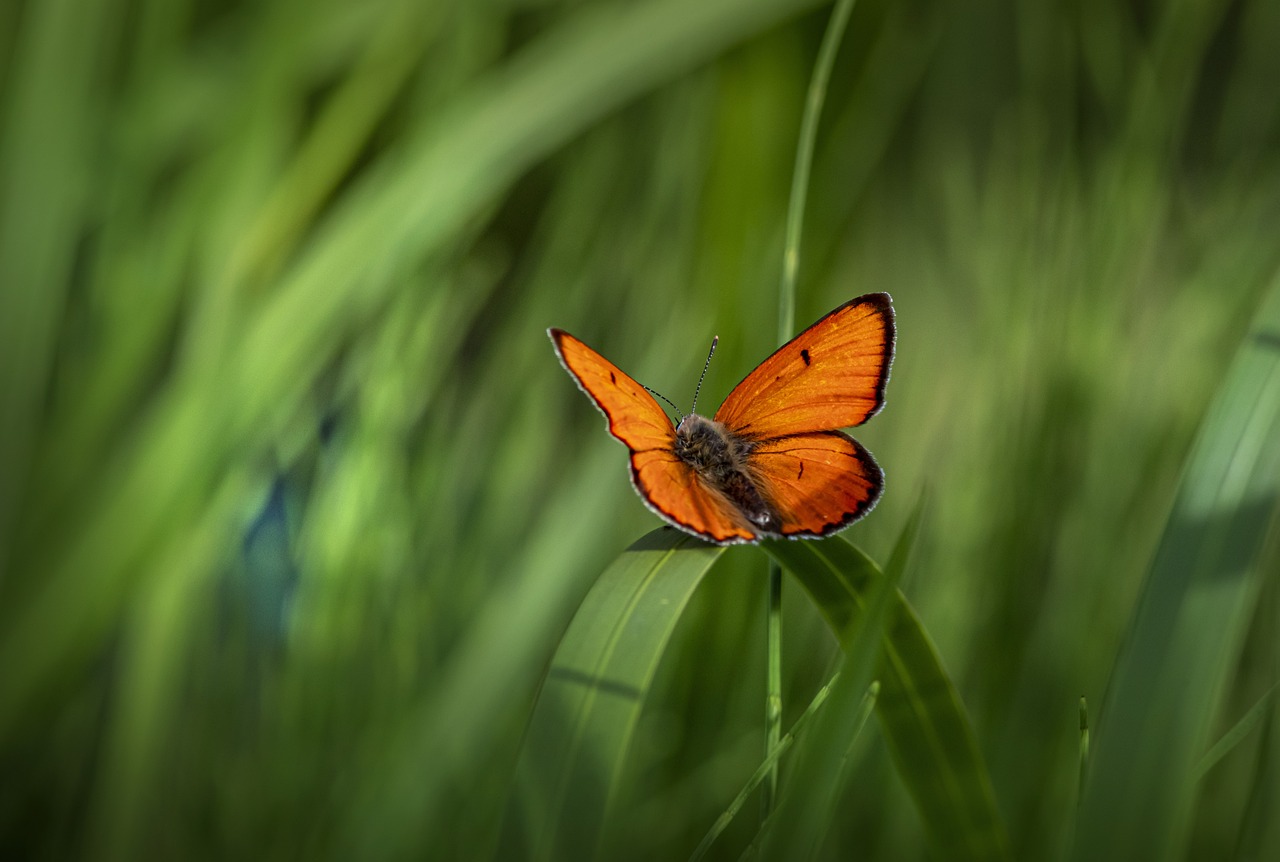
Music as a Tool for Awareness
Music has an incredible ability to touch hearts and inspire minds, making it a powerful medium for raising awareness about pressing environmental issues. Think about it: when you hear a catchy tune, it often sticks in your head, right? Now, imagine that tune carrying a message about the importance of protecting our planet. That's the magic of music as a tool for awareness!
From folk songs that tell stories of nature's beauty to pop anthems that rally for climate action, music transcends barriers and connects people on a deep emotional level. Artists like Billie Eilish and Coldplay have used their platforms to shine a spotlight on sustainability, encouraging fans to rethink their habits and consider the impact of their choices on the environment.
Moreover, music can serve as a rallying cry for movements. For instance, during the Earth Day celebrations, various musicians come together to perform songs that highlight environmental issues, creating a sense of urgency and collective responsibility. These events not only entertain but also educate the audience about sustainability practices. Just think about the last time you heard a song that made you want to take action—whether it was reducing plastic use or supporting renewable energy initiatives!
One of the most effective ways music raises awareness is through lyrical content. Artists often weave messages about climate change, pollution, and conservation into their songs. For example, the lyrics of “Big Yellow Taxi” by Joni Mitchell poignantly remind us of the beauty we risk losing if we don’t take action. This emotional connection can motivate listeners to engage with environmental issues in a way that statistics and reports often fail to do.
Furthermore, music festivals and concerts often incorporate sustainability themes, encouraging attendees to reflect on their environmental impact. For instance, many festivals now promote zero waste initiatives, encouraging fans to bring reusable containers and recycle waste. These practices not only reduce the ecological footprint of such events but also educate attendees about sustainable living. It’s a win-win situation!
In addition, social media has amplified the reach of music as a tool for awareness. Artists share their eco-friendly practices and promote environmental campaigns, engaging their followers in meaningful conversations about sustainability. Through platforms like Instagram and TikTok, music can spread like wildfire, reaching millions and inspiring change. It's like planting seeds of awareness that bloom into a forest of action!
Ultimately, the fusion of music and environmental awareness creates a powerful symphony of change. By harnessing the emotional resonance of music, we can inspire individuals to not only listen but also act. Whether it’s through attending eco-conscious concerts, sharing songs that advocate for the planet, or simply reflecting on the messages conveyed in lyrics, music has the potential to be a transformative force in promoting sustainable living.

Community Engagement through Music
Music has an incredible ability to unite people, and when it comes to promoting sustainable living, it serves as a powerful catalyst for community engagement. Imagine a vibrant local park filled with the sounds of live music, laughter, and the aroma of eco-friendly food stalls. These community events often incorporate music not just as entertainment, but as a means to bring people together, fostering collaboration and encouraging collective action towards sustainable living practices and environmental stewardship. Through the universal language of music, individuals from different backgrounds can come together, share their stories, and inspire one another to make a difference.
One of the most effective ways music promotes sustainability is through local music festivals. These events often highlight eco-friendly practices, serving as a model for how music and environmentalism can coexist harmoniously. For example, many festivals implement waste reduction initiatives, such as encouraging attendees to bring reusable containers and providing recycling stations. Additionally, they often source food and materials locally, minimizing their carbon footprint while supporting local economies. By raising funds for environmental causes, these festivals not only entertain but also educate and empower communities to take action.
Moreover, the role of eco-conscious artists cannot be overstated. Many musicians use their platform to advocate for environmental issues, weaving messages about sustainability into their lyrics, performances, and public appearances. This not only raises awareness but also inspires fans to reflect on their own lifestyles and consider how they can contribute to a more sustainable future. Imagine attending a concert where the artist passionately discusses their commitment to reducing plastic waste, encouraging the audience to join them in making small changes that can lead to significant impacts. It's these moments that create a ripple effect, motivating individuals to take action.
In addition to individual artists, collaborative musical projects can unite diverse groups, encouraging them to work together towards common sustainability goals while celebrating local culture and talent. For instance, community choirs or bands that focus on environmental themes foster a sense of belonging and purpose among participants. These collaborations can also serve as platforms for educating audiences about pressing environmental issues, creating a shared sense of responsibility towards the planet.
Ultimately, community engagement through music creates a vibrant tapestry of shared experiences that not only entertain but also inform and inspire. As individuals come together to celebrate music, they also cultivate a deeper connection to their environment and each other. This synergy is essential for fostering a culture of sustainability that resonates beyond the music, encouraging collective action and a commitment to preserving our planet for future generations.
- How can music festivals promote sustainable practices?
Music festivals can promote sustainability by implementing waste reduction initiatives, sourcing food locally, and raising funds for environmental causes. - What role do artists play in environmental advocacy?
Many artists use their platform to raise awareness about environmental issues, incorporating sustainability messages into their music and performances. - How can community music projects foster sustainability?
Collaborative music projects can unite diverse groups, encouraging teamwork towards sustainability goals while celebrating local culture.

Local Music Festivals
Local music festivals are more than just a celebration of sound; they serve as vibrant platforms for promoting sustainable practices within our communities. Imagine a sun-soaked field, filled with the sounds of local bands, laughter, and the aroma of delicious, organic food. These festivals often bring together artists, vendors, and attendees who share a common goal: to raise awareness about environmental issues while having a fantastic time. Through various initiatives, such as waste reduction and local sourcing, these gatherings not only entertain but also educate.
One of the standout features of local music festivals is their commitment to eco-friendly practices. Many festivals implement strategies to minimize waste, such as encouraging attendees to bring reusable containers, providing recycling stations, and using biodegradable materials. For example, the Green Music Festival has made significant strides in reducing its carbon footprint by partnering with local farms to source food and beverages, thereby supporting the local economy and reducing transportation emissions.
Moreover, these events often serve as fundraisers for environmental causes. Attendees can enjoy live music while contributing to initiatives that protect their local ecosystems. For instance, proceeds from ticket sales may go towards local conservation projects or educational programs aimed at promoting sustainability. This creates a sense of community and shared responsibility, as everyone feels they are part of something larger than themselves.
Local music festivals also provide a unique opportunity for eco-conscious artists to showcase their work. Many musicians are passionate about environmental issues and use their platform to advocate for change. Through their lyrics and performances, they inspire audiences to think critically about their impact on the planet. The synergy between music and activism creates a powerful force for raising awareness and driving action.
In addition to raising awareness, local music festivals foster a sense of community engagement. When people come together to enjoy music, they also connect with like-minded individuals who share their values. This camaraderie can lead to collaborative projects that focus on sustainability, such as community gardens, clean-up events, or workshops on eco-friendly practices. The festival becomes a melting pot of ideas and inspiration, igniting passion for the environment among attendees.
In summary, local music festivals play a crucial role in promoting sustainable living. They not only entertain but also educate and inspire action. By bringing people together and highlighting eco-friendly practices, these festivals create a ripple effect that extends beyond the event itself, encouraging individuals to adopt more sustainable lifestyles. So, the next time you find yourself at a local music festival, take a moment to appreciate the harmony between the music and the message of sustainability that resonates throughout the event.
- What are some eco-friendly practices at local music festivals?
Many festivals promote waste reduction, use biodegradable materials, and source food locally to minimize their environmental impact. - How can I support sustainability at music festivals?
Consider bringing reusable containers, recycling, and supporting vendors that prioritize eco-friendly practices. - Are there specific artists known for their environmental advocacy?
Yes, many artists incorporate messages about sustainability into their music and performances, using their platform to inspire change.

Eco-Conscious Artists
In today’s world, where environmental issues are at the forefront of global discussions, play a pivotal role in shaping public perception and inspiring action. These artists use their voices, platforms, and creativity to raise awareness about sustainability and the importance of protecting our planet. Through their music, they convey messages that resonate deeply with audiences, encouraging fans to reflect on their own lifestyles and consider more sustainable choices.
Many eco-conscious artists incorporate themes of nature and environmental stewardship directly into their lyrics and performances. For instance, songs that discuss the beauty of the natural world often serve as a reminder of what is at stake if we continue on a path of environmental degradation. By weaving these themes into their art, these musicians not only entertain but also educate their audience about pressing issues such as climate change, pollution, and biodiversity loss.
Moreover, these artists frequently engage in activism beyond their music. They participate in community events, collaborate with environmental organizations, and even launch their own initiatives aimed at promoting sustainability. For example, some artists have created charity concerts where proceeds go directly to environmental causes, effectively turning their performances into powerful fundraising platforms. Here are a few ways in which eco-conscious artists contribute to sustainability:
- Advocacy through Lyrics: Many artists write songs that highlight environmental issues, making complex topics more accessible to their audience.
- Community Engagement: They often participate in local events, using their influence to bring people together for a cause.
- Fundraising Initiatives: By organizing benefit concerts or donating a portion of their sales, they support environmental organizations directly.
Additionally, the rise of social media has provided these artists with a platform to reach a broader audience. Through posts, videos, and live streams, they can share their messages and promote sustainable practices in real-time. This direct engagement fosters a sense of community among fans, encouraging them to become part of the solution. Artists like Jack Johnson and Ben Harper have been known to advocate for environmental causes, using their music as a vehicle for change.
Ultimately, eco-conscious artists remind us that music can be a powerful catalyst for change. By blending art with activism, they inspire listeners to take action, whether it’s reducing waste, supporting local farmers, or participating in community clean-up efforts. Their contributions to the sustainability movement are invaluable, proving that creativity and environmental responsibility can go hand in hand.
- What makes an artist eco-conscious? Eco-conscious artists integrate environmental themes into their music and actively participate in sustainability efforts, raising awareness through their platforms.
- How can I support eco-conscious artists? You can support them by attending their concerts, buying their music, and sharing their messages on social media.
- Are there specific genres that focus more on sustainability? While eco-conscious messages can be found across all genres, folk, indie, and reggae often have a strong tradition of environmental themes.

Collaborative Projects
Collaborative musical projects are a vibrant and dynamic way to unite diverse groups of people, all working towards common sustainability goals while celebrating local culture and talent. These projects often bring together musicians, environmentalists, and community members, creating a rich tapestry of creativity and shared purpose. Imagine a local park transformed into a lively hub of sound, where artists from various genres come together to perform, educate, and inspire. This is not just about music; it’s about fostering a sense of community and shared responsibility towards our planet.
One of the most exciting aspects of these collaborative projects is how they often incorporate local environmental issues into their themes. For instance, a concert series might focus on the importance of clean waterways, with artists dedicating their performances to raise awareness about pollution in local rivers. By weaving environmental narratives into their music, these artists not only entertain but also educate their audience, making the message resonate on a deeper level.
Moreover, these projects can take many forms, including:
- Community Choirs: Local choirs can come together to perform songs that highlight environmental themes, creating a powerful collective voice for change.
- Benefit Concerts: These events raise funds for local environmental causes, showcasing the talents of local musicians while supporting sustainability initiatives.
- Workshops and Collaborations: Musicians might collaborate with environmental organizations to create educational workshops, teaching participants about both music and sustainability.
What makes these collaborative projects truly special is their ability to foster connections among participants. When people come together with a shared passion for music and the environment, it creates a sense of camaraderie that can lead to lasting friendships and partnerships. This sense of community is essential for driving forward sustainable practices, as individuals feel more empowered to take action when they are part of a larger movement.
As we look to the future, the potential for collaborative projects in music and sustainability is immense. With technology allowing for virtual collaborations and global outreach, artists can connect with audiences far beyond their local communities. Imagine a world where a musician in one country teams up with a group in another, creating a song that speaks to environmental challenges faced globally. This not only amplifies the message but also fosters a sense of global unity in the fight for a sustainable future.
Q: How can I get involved in collaborative music projects focused on sustainability?
A: Look for local community organizations, music festivals, or environmental groups that host events or workshops. Social media platforms can also be a great way to connect with like-minded individuals and find opportunities.
Q: What types of music are typically involved in these projects?
A: Collaborative projects can feature a wide range of genres, from folk and rock to hip-hop and classical. The key is that the music resonates with the themes of sustainability and environmental awareness.
Q: Can these projects really make a difference?
A: Absolutely! By raising awareness and inspiring action through music, these projects can lead to increased community engagement and support for environmental initiatives.

Music Education and Sustainability
When it comes to intertwining music education with sustainability, the possibilities are as vast as the ocean! Imagine a classroom buzzing with the sounds of instruments, where students not only learn to play but also delve into the profound impact their music can have on the environment. This unique blend of education fosters a sense of responsibility and creativity among young learners, inspiring them to think critically about their role in promoting a sustainable future.
Music education programs that incorporate environmental themes can engage students in a variety of ways. For instance, teachers can use songs that address climate change or conservation, allowing students to explore these topics through the lens of music. This approach not only enhances their musical skills but also deepens their understanding of pressing global issues. By learning songs that advocate for sustainability, students are encouraged to reflect on their own habits and consider how they can contribute to a healthier planet.
Moreover, hands-on projects can further enhance this educational experience. For example, students might participate in creating their own musical compositions inspired by nature. This could involve using recycled materials to make instruments or incorporating sounds from their environment into their music. Such activities not only cultivate creativity but also highlight the importance of resourcefulness and innovation in sustainability efforts.
Additionally, schools can organize concerts or events that focus on sustainability themes, inviting local eco-conscious artists to perform. These events serve as a platform for students to showcase their talents while raising awareness about environmental issues. By collaborating with local musicians, students can learn firsthand how art can be a powerful tool for change, igniting their passion for both music and the planet.
To illustrate the impact of music education on sustainability, consider the following table that outlines key benefits:
| Benefit | Description |
|---|---|
| Enhanced Awareness | Students learn about environmental issues through music, fostering a sense of responsibility. |
| Creative Expression | Music provides a medium for students to express their thoughts and feelings about sustainability. |
| Community Engagement | Music events can bring communities together to support environmental causes. |
| Resourcefulness | Creating music with recycled materials teaches students about reusing and repurposing. |
In conclusion, integrating music education with sustainability not only enriches the learning experience but also empowers the next generation to take action. By nurturing their creativity and awareness, we can inspire young minds to become passionate advocates for the environment, ensuring a brighter and more sustainable future for all. So, why not take a moment to consider how music can play a pivotal role in shaping a more sustainable world? After all, every note played and every song sung can be a step towards a greener planet!
- How can music education promote sustainability?
Music education can promote sustainability by incorporating environmental themes into lessons, encouraging students to create music using recycled materials, and organizing events that raise awareness about environmental issues. - What are some examples of sustainability-themed songs?
Many artists have written songs about environmental issues, such as "Big Yellow Taxi" by Joni Mitchell or "Earth Song" by Michael Jackson. These songs can be used in educational settings to discuss sustainability. - Can music festivals contribute to sustainability?
Absolutely! Many music festivals implement eco-friendly practices such as waste reduction, promoting local vendors, and raising funds for environmental causes, thus fostering a culture of sustainability.
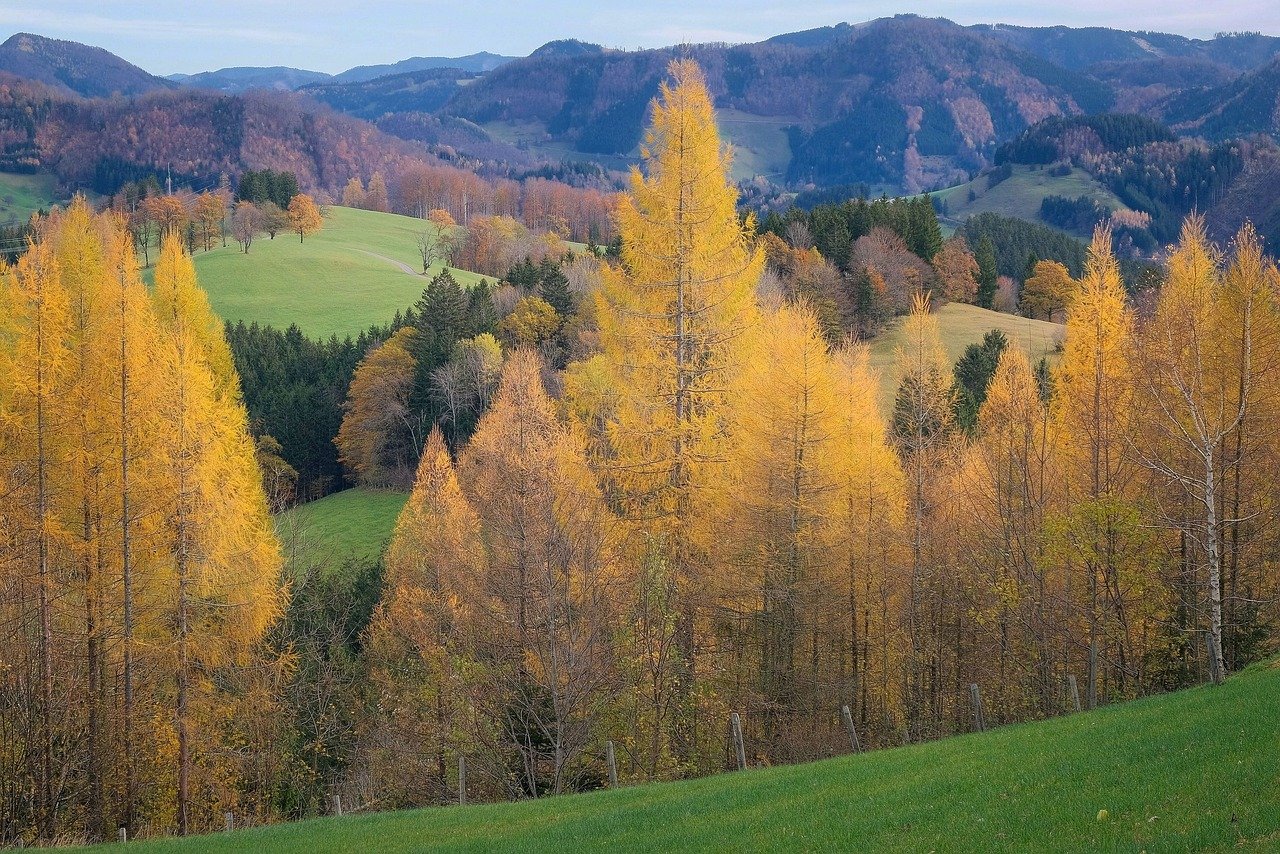
Soundscapes and Nature
Have you ever paused to listen to the gentle rustling of leaves or the melodic chirping of birds? The relationship between music and nature is not just a casual affair; it's a profound connection that resonates deeply within us. Soundscapes, which are essentially the acoustic environments we inhabit, play a crucial role in linking individuals to their surroundings. They foster a sense of responsibility towards preserving the beauty and integrity of our natural world. Imagine walking through a forest, where the symphony of nature surrounds you—each sound telling a story of life and interconnectedness. This immersive experience can ignite a passion for environmental stewardship, making us more aware of the delicate balance we must maintain.
Field recordings, for example, serve as a powerful medium to capture these natural sounds. By immersing ourselves in these recordings, we can develop a deeper understanding of biodiversity and the importance of protecting our ecosystems. These audio snapshots not only raise awareness but also evoke emotions that can inspire action. When we hear the distant call of a loon or the rustle of a deer in the underbrush, we are reminded of the beauty that exists beyond our urban jungles. It’s a call to arms, urging us to protect these habitats before they fade into silence.
Moreover, composers and musicians often draw inspiration from the natural world, creating pieces that reflect environmental themes. Take, for instance, the works of composers who integrate the sounds of nature into their compositions. These musical representations of nature do more than just entertain; they encourage listeners to appreciate and protect the environment. Think of it as a musical love letter to the earth, where each note is a reminder of the beauty that surrounds us. In this way, music acts as a bridge, connecting us to the very essence of our planet.
As we navigate through the complexities of modern life, it's easy to forget our roots. However, soundscapes remind us of our place within the larger ecosystem. They prompt us to reflect on our actions and their impact on the environment. In a world that often feels disconnected from nature, music and sound can serve as powerful tools to rekindle that bond. So, the next time you find yourself outside, take a moment to listen. What stories are the sounds around you telling? How can you contribute to preserving that beautiful symphony?
- What are soundscapes? Soundscapes refer to the acoustic environment as perceived by humans. They include all the sounds we hear in a particular environment, such as nature sounds, human-made sounds, and more.
- How can music help in environmental awareness? Music has the power to convey messages and evoke emotions, making it an effective medium for raising awareness about environmental issues and inspiring action.
- What are field recordings? Field recordings are audio captures of natural sounds in their environment, often used to raise awareness about biodiversity and the importance of conservation.
- Can listening to nature sounds improve well-being? Yes, studies suggest that listening to nature sounds can reduce stress, enhance mood, and improve overall mental health.

Field Recordings
Field recordings are an incredible way to bridge the gap between music and the natural world. Imagine walking through a lush forest, the sound of rustling leaves, chirping birds, and babbling brooks all around you. When these sounds are captured and presented as field recordings, they create an immersive auditory experience that transports listeners to these serene environments. This practice not only highlights the beauty of nature but also serves as a powerful reminder of the biodiversity that exists in our world, which is often taken for granted.
One of the most compelling aspects of field recordings is their ability to raise awareness about environmental issues. By listening to the sounds of a rainforest, for example, listeners can develop a deeper appreciation for this vital ecosystem. They become more aware of the threats these environments face, such as deforestation and climate change. In this way, field recordings act as a form of activism, encouraging individuals to take action to protect the planet.
Moreover, field recordings can be used in various artistic projects, from sound art installations to music compositions. Artists and musicians often incorporate these natural sounds into their work, creating a unique blend of organic and electronic music. This fusion not only enriches the listening experience but also emphasizes the importance of nature in artistic expression. By showcasing the sounds of the environment, artists can inspire audiences to reflect on their relationship with nature and the need for sustainable practices.
To illustrate the impact of field recordings, consider the following table that outlines some notable projects and their contributions to environmental awareness:
| Project Name | Description | Impact |
|---|---|---|
| Sounds of the Forest | A collection of recordings from various forests around the world. | Increased awareness of deforestation and habitat loss. |
| Ocean Waves | Captures the sounds of coastal environments and marine life. | Highlights the importance of ocean conservation. |
| Urban Soundscapes | Records the sounds of city life, blending natural and urban sounds. | Encourages discussions on urban sustainability and green spaces. |
In addition to raising awareness, field recordings can also foster a sense of community. When shared in public spaces or during community events, these recordings can spark conversations about local environmental issues. People begin to connect over shared experiences and feelings towards their surroundings, leading to collaborative efforts in conservation and sustainability. It's a beautiful cycle—music brings people together, and together, they can make a difference.
As we continue to explore the role of field recordings in promoting sustainability, it becomes clear that they are more than just sounds; they are a call to action. They remind us of the beauty that surrounds us and the urgent need to protect it. So, the next time you hear the gentle rustle of leaves or the distant call of a bird, take a moment to appreciate the sound and consider what you can do to help preserve the natural world.
- What are field recordings? Field recordings are audio captures of natural sounds from various environments, often used to raise awareness about ecological issues.
- How can field recordings promote sustainability? They highlight the beauty of nature and the importance of preserving it, encouraging listeners to take action towards environmental protection.
- Can anyone create field recordings? Yes! With a simple recording device, anyone can capture the sounds around them and share them with others.
- What is the impact of using field recordings in music? They create a unique listening experience that blends natural and musical elements, fostering a deeper connection to the environment.

Musical Representations of Nature
When we think about music, we often imagine catchy tunes or powerful lyrics that resonate with our emotions. However, there's a deeper layer to music that connects us to the world around us—nature. Composers and musicians throughout history have drawn inspiration from the natural environment, creating pieces that not only reflect the beauty of the earth but also convey messages about its preservation. This relationship between music and nature is profound, as it evokes feelings of wonder and responsibility towards our planet. Imagine listening to a symphony that mimics the sounds of a forest, the gentle rustling of leaves, or the rhythmic flow of a river. These musical representations of nature serve as a reminder of the intricate beauty that surrounds us and the urgent need to protect it.
One notable example of this is the work of composers like Claude Debussy, whose pieces often encapsulate the essence of nature. His composition "La Mer" transports listeners to the ocean, capturing the ebb and flow of waves with delicate harmonies and intricate melodies. Similarly, John Cage took a unique approach by incorporating environmental sounds into his works, challenging the conventional boundaries of music and inviting listeners to appreciate the sounds of their surroundings. This kind of musical representation not only entertains but also educates, encouraging us to listen more closely to the world around us.
Moreover, contemporary artists are increasingly using their platforms to highlight environmental issues through their music. For instance, many songs now include lyrics that speak to the urgency of climate change or the importance of biodiversity. These artists understand that their influence can inspire action, and they harness the power of music to raise awareness. By weaving themes of nature into their work, they create a connection between their audience and the environment, fostering a sense of responsibility and urgency.
In addition to individual artists, entire genres have emerged that focus on environmental themes. Folk music, for example, often celebrates the beauty of nature and rural life, while also addressing social and environmental justice issues. This genre not only entertains but also serves as a platform for advocacy, bringing communities together to discuss and act upon pressing environmental concerns.
Ultimately, the musical representations of nature serve as a powerful reminder of our connection to the earth. They inspire us to appreciate the beauty of our surroundings and motivate us to take action in preserving it. As we listen to these compositions, we are reminded of our responsibility to protect the environment for future generations. So, the next time you find yourself lost in a beautiful melody, take a moment to reflect on the natural world that inspired it.
- How does music raise awareness about environmental issues?
Music can convey powerful messages and emotions, making it an effective medium for raising awareness about environmental issues. Through lyrics and themes, artists can inspire listeners to take action and engage with sustainability efforts. - Are there specific genres of music that focus on nature?
Yes, genres like folk, classical, and world music often include themes related to nature and environmental issues, celebrating the beauty of the earth and advocating for its protection. - Can music festivals promote sustainability?
Absolutely! Many music festivals incorporate eco-friendly practices, such as waste reduction initiatives and local sourcing, while also raising funds for environmental causes.

The Future of Music and Sustainability
As we step into a new era, the music industry is beginning to recognize its role in promoting sustainability. With the growing awareness around environmental issues, artists, producers, and even fans are looking for ways to make a positive impact. Imagine a world where your favorite concerts not only entertain but also contribute to the health of our planet. Sounds amazing, right? Well, that future is closer than you think!
One of the most exciting developments is the shift towards eco-friendly production methods. Many artists are now opting for sustainable materials in their merchandise, using biodegradable packaging, and even choosing venues that prioritize environmental responsibility. This is not just about reducing waste; it's about setting a precedent. When big-name artists take a stand, it encourages their fans and the industry at large to follow suit.
Furthermore, the rise of digital music has drastically reduced the carbon footprint associated with physical media. Streaming platforms are becoming increasingly popular, and while they do have their own environmental challenges, the overall reduction in CD production and distribution is a step in the right direction. However, it’s essential for these platforms to invest in renewable energy sources to power their data centers, thus amplifying their commitment to sustainability.
In addition to production, the messages conveyed through music are evolving. Artists are using their platforms to address pressing environmental issues, from climate change to plastic pollution. Think of songs that inspire action and encourage listeners to adopt more sustainable lifestyles. This isn’t just a trend; it’s a movement. As more musicians embrace this cause, the potential for widespread change becomes even greater.
Moreover, we are witnessing a surge in collaborative projects that unite artists from different genres and backgrounds. These projects often focus on environmental themes and bring together diverse communities to spread awareness through music. For example, benefit concerts for environmental charities have become increasingly popular, showcasing how music can harness collective energy for a greater cause.
As we look to the future, the integration of technology will also play a crucial role in shaping sustainable practices in music. Innovations like virtual reality concerts and online music festivals can reduce the need for travel, thus lowering carbon emissions. Imagine attending a live concert from the comfort of your home while still feeling the energy of the performance! This could revolutionize the way we experience music and its impact on the environment.
In conclusion, the future of music and sustainability is bright and full of potential. As artists and fans become more conscious of their choices, the music industry can pave the way for a more sustainable future. By embracing eco-friendly practices, spreading awareness through powerful lyrics, and harnessing technology, we can ensure that music not only entertains but also heals our planet. So, next time you jam out to your favorite tunes, remember that you’re part of a larger movement towards a sustainable world!
- How can music festivals promote sustainability?
Music festivals can promote sustainability by implementing waste reduction initiatives, encouraging recycling, and sourcing food and materials locally. - What role do artists play in environmental advocacy?
Artists can raise awareness about environmental issues through their lyrics, performances, and public appearances, inspiring fans to take action. - Are there any eco-friendly music platforms?
Yes, some streaming platforms are investing in renewable energy and adopting sustainable practices to reduce their environmental impact. - How can technology help in promoting sustainable music practices?
Technology can facilitate virtual concerts and online events, reducing the need for travel and minimizing carbon footprints.
Frequently Asked Questions
- How does music raise awareness about environmental issues?
Music has a unique ability to connect emotionally with listeners, making it a powerful medium for spreading awareness about sustainability. Artists often write songs that highlight environmental challenges, encouraging fans to reflect on their own habits and the impact of their actions on the planet.
- What role do local music festivals play in promoting sustainability?
Local music festivals are not just about great tunes; they often incorporate eco-friendly practices such as waste reduction, promoting local vendors, and supporting environmental causes. These events create a vibrant community atmosphere where attendees can learn about sustainability while enjoying live performances.
- How can music education inspire sustainable living?
Integrating music education with environmental topics can make learning about sustainability fun and engaging for younger generations. Through songs, performances, and creative projects, students can develop a deeper understanding of ecological issues and be inspired to adopt more sustainable lifestyles.
- What are soundscapes and how do they relate to nature?
Soundscapes are audio environments that capture the sounds of nature, such as birds singing or water flowing. By immersing listeners in these natural sounds, they can foster a greater appreciation for biodiversity and the importance of preserving our ecosystems.
- Are there artists who focus on environmental themes in their music?
Absolutely! Many artists use their platform to advocate for environmental issues, weaving messages of sustainability into their lyrics and performances. This not only raises awareness but also encourages fans to think critically about their environmental impact.
- How is the music industry evolving towards sustainability?
The music industry is increasingly adopting sustainable practices, from using eco-friendly production methods to promoting messages of environmental responsibility across various genres. This shift reflects a growing awareness of the industry's impact on the planet and a commitment to making positive changes.

